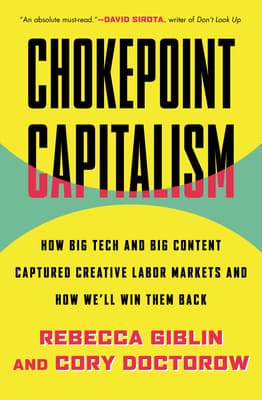
Book Review Summary: Chokepoint Capitalism: How Big Tech and Big Content Captured Creative Labor Markets and How We'll Win Them Back
Introduction
"Chokepoint Capitalism: How Big Tech and Big Content Captured Creative Labor Markets and How We'll Win Them Back" by Rebecca Giblin and Cory Doctorow is a thought-provoking book that delves into the exploitative practices of big tech and big content corporations in capturing creative labor markets. The authors explore how these corporations create barriers to competition, leading to monopolies and monopsonies that disproportionately harm creative workers. In this article, we will summarize the main points of the book, analyze readers' views, and provide reasons for both recommending and not recommending it.
About Rebecca Giblin
Rebecca Giblin is a professor at Melbourne Law School, where she researches at the intersection of law and culture. Her three books, including "Chokepoint Capitalism," take new lenses to cultural challenges, using them to disentangle seemingly intractable problems. With a focus on creative labor markets, Giblin's work sheds light on the exploitation faced by artists and offers solutions for reclaiming their power and profit.
Analysis of Views
-
In-depth analysis of the problem: Readers praise the book for its detailed and in-depth analysis of the various industries affected by chokepoint capitalism. The authors provide insightful examples, such as Amazon's influence on publishing, Spotify's role in music streaming, and the impact of monopsonies on screenwriting and radio. The first part of the book is considered nearly flawless, as it effectively describes the problem faced by creative workers.
-
Interesting solutions proposed: While some readers find the proposed solutions lacking in specificity and detail, others appreciate the range of ideas presented in the second part of the book. These solutions include transparency rights, collective action, radical interoperability, contract terminations, job guarantees, and minimum wages for creative work. While these ideas may not be fully feasible or realistic, they offer a starting point for discussion and potential reform.
-
Importance of the subject matter: Many readers consider this book a necessary read for our times. They appreciate the authors' ability to shed light on how big corporations have not only controlled our wallets but also corrupted our culture by exploiting creative workers. The book serves as a valuable entryway into understanding the vice grip of corporate power and how it affects our society.
-
Potential for systemic change: Readers appreciate the authors' exploration of resistance and recommendations for systemic approaches to addressing chokepoint capitalism. While some find the solutions presented challenging or pie in the sky, they believe that understanding the structural issues is essential for making meaningful change.
Reasons for Recommendation
-
In-depth analysis of the problem: The book provides a comprehensive understanding of the challenges faced by creative workers in various industries, making it an essential read for anyone interested in understanding the impact of chokepoint capitalism.
-
Potential for systemic change: Although some readers find the proposed solutions unrealistic or lacking in detail, the book offers a range of ideas that can spark conversations about systemic reform and potential changes in industries affected by monopolies and monopsonies.
-
Importance of the subject matter: The book addresses a crucial issue that affects not only creative workers but also society as a whole. By understanding how big corporations exploit creative labor markets, readers can become more informed and engaged in advocating for change.
Reasons for Not Recommendation
-
Lack of specificity in solutions: Some readers find that the proposed solutions in the second part of the book lack specificity and detail, leaving them feeling frustrated or disillusioned about their feasibility. While these ideas may serve as starting points for discussion, they may not provide concrete answers or actionable steps for individuals to take.
-
Occasionally sensationalist: A few readers perceive the book as occasionally sensationalist, which may detract from its overall credibility. While it is important to highlight the exploitative practices of big tech and big content corporations, some readers feel that the authors may exaggerate certain points to make their case more compelling.
Conclusion
"Chokepoint Capitalism: How Big Tech and Big Content Captured Creative Labor Markets and How We'll Win Them Back" by Rebecca Giblin and Cory Doctorow is a thought-provoking book that sheds light on the exploitative practices of big tech and big content corporations in capturing creative labor markets. Through detailed analysis and proposed solutions, it offers valuable insights into the challenges faced by creative workers and the potential for systemic change. While some readers find the lack of specificity in solutions disappointing, others appreciate the importance of addressing this crucial issue in our society. Overall, this book is recommended for those interested in understanding chokepoint capitalism and its impact on creative labor markets, as well as those seeking potential solutions for systemic reform.